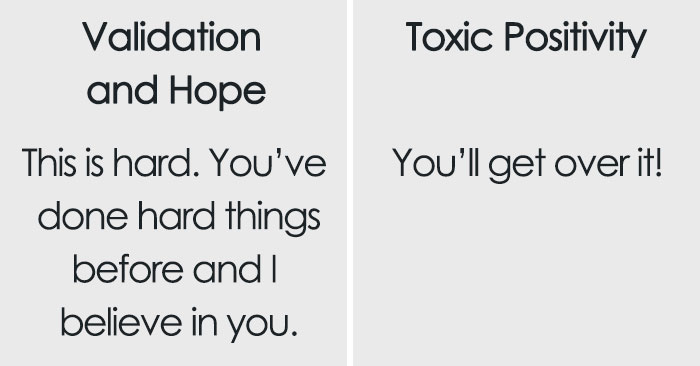When someone comes to you with a problem or a struggle they're facing, it's a natural reflex for most of us to say something along the line, "just be positive!" Well, according to a therapist, this advice is "toxic" and totally unhelpful.
It's a daily struggle for everyone to try to find a silver lining in their lives. Life can wretchedly beat you down, and sometimes you need to dig deeper to find positivity and reassurance in yourself so that you can carry on and move forward.
Nobody wants to be kicked when they're already down, so naturally, we think telling people uplifting mantras about positivity might give them the boost they need.
But still, this might not do them any good at the end of the day— because you can't force a positive feeling or attitude on someone if they don't have it within themselves.
Psychotherapist Whitney Hawkins Goodman, LMFT, owner of The Collaborative Counseling Center, runs an Instagram account called @sitwithwhit. She recently shared a life-changing chart on the difference between giving someone validation and hope versus toxic positivity, and it's making waves on the internet.

Hawkins claims that people who are facing some life struggles can be harmed by the 'toxic positivity.'
Along with the post, Hawkins wrote:
"I've realized people HATE the word toxic. I hear ya'll. Got a lot of comments on "never give up." Decided to keep it. There are relationships, life goals, plans, and situations that are OK to give up on. Not everything needs to result in completion. Sometimes it is safer to give up. We owe each other the space to discuss the options."







This is a hard-to-face truth. Supporting someone isn't about being 'positive'
In fact, when you force positivity down someone's throat, it can actually result in negative effects. "Toxic positivity" makes people feel unsafe expressing their negativity, and negativity often thrives in isolation.
This can make someone think there's something wrong with them for not simply "choosing" happiness.
So, when you're supporting someone who's hurting, you need to leave room for positivity to grow. And you don't yell at a flower to 'JUST' grow. No— you water it.
In this case, you water it by listening to their problems and offering hope and validation, and unconditional support.
It's okay to experience negative emotions, and simply telling someone facing struggles to "be positive" doesn't cut it. But with support, we can help them find their own way out.
Summing up the post, Hawkins asked her followers, "What are some other positive sayings that you think are totally dismissive?"
And people loved the chart and thought it nailed this life-changing lesson.






